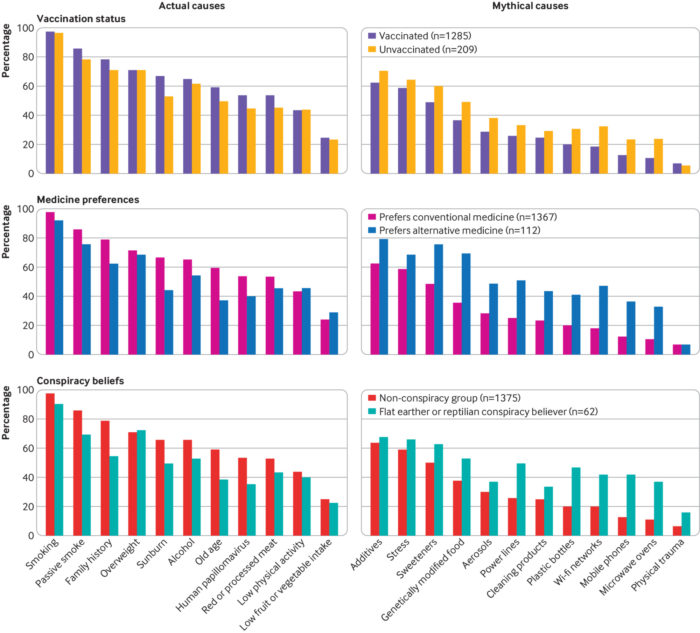Dec 22 2022
Can Misinformation Cause Cancer?
 What are the known factors that increase the risk of getting cancer? Most people know about smoking, but can probably only guess at other factors, and are likely to endorse things that do not contribute to cancer risk. The known contributors to cancer risk include: smoking, consuming alcohol, low levels of physical activity, getting sunburnt as a child, family history of cancer, HPV infection, and being overweight. But there are also a number of “mythic” causes that do not contribute to cancer risk but are widely believed to: artificial sweeteners or additives and genetically modified food; using microwave ovens, aerosol containers, mobile phones, and cleaning products; living near power lines and feeling stressed.
What are the known factors that increase the risk of getting cancer? Most people know about smoking, but can probably only guess at other factors, and are likely to endorse things that do not contribute to cancer risk. The known contributors to cancer risk include: smoking, consuming alcohol, low levels of physical activity, getting sunburnt as a child, family history of cancer, HPV infection, and being overweight. But there are also a number of “mythic” causes that do not contribute to cancer risk but are widely believed to: artificial sweeteners or additives and genetically modified food; using microwave ovens, aerosol containers, mobile phones, and cleaning products; living near power lines and feeling stressed.
These are all lifestyle factors that people can influence by changing their behavior. Therefore there is a direct utility to informing the public about the true causes of cancer and identifying the factors that they should not worry about. I see the effects of misinformation and poor communication on a regular basis. Often my patients will express to me that they are highly motivated to get healthier by changing their lifestyle, and then they rattle off a list of things they are doing, most of which are useless or counterproductive. Forget all that – just stop smoking and let’s talk about a healthy and practical exercise routine for you.
A recent study seeks to shed light on why there is so much misinformation about the modifiable causes of cancer. This is a complex question, and any one study is only going to look at a tiny slice of potential contributing factors. Also, this is the type of question that is hard to look at in a controlled experiment, so we will have to make due with observational data that can have a lot of confounding factors. The authors did a survey of several English and Spanish language forums, assessing knowledge of true and mythic causes of cancer, and correlating them with belief in conspiracies, preference for alternative medicine, and lack of COVID-19 vaccination. The results are pretty much what you would expect, but let’s dive into some details.
The authors report:
Awareness of the actual causes of cancer was greater (median CAM score 63.6%) than that of mythical causes (41.7%). The most endorsed mythical causes of cancer were eating food containing additives or sweeteners, feeling stressed, and eating genetically modified food. Awareness of the actual and mythical causes of cancer among the unvaccinated, alternative medicine, and conspiracy groups was lower than among their counterparts.
It’s good that more people endorsed true rather than mythic causes of cancer, but the difference is not as large as we would hope. Also, this difference is mostly driven by endorsement of smoking as a major cause of cancer (endorsed by 97.4% of respondents), which is not surprising. Take this factor out and the results are much closer together. If you look just at diet factors, the results are flipped:
By contrast, less than 25% (n=369) of the participants correctly identified low intake of fruits and vegetables as a cause of cancer. The most endorsed mythical causes of cancer were eating food containing additives (63.9%; n=954) or sweeteners (50.7%; n=758), feeling stressed (59.7%; n=892), and eating genetically modified foods (38.4%; n=573)
Significantly more people believed that artificial sweeteners or GMOs cause cancer (false) than people who believed that low intake of fruits and vegetables causes cancer (true). (As an aside, the literature will often use the word “cause” as convenient shorthand to mean that it increases the statistical risk, but it seems that people generally understand that.) These results fit with my anecdotal experience -when patients discuss eating healthy they generally get the actual healthy factors wrong.
The researchers also found that awareness of true factors contributing to cancer were lower among those who endorse alternative medicine or conspiracy theories or reject vaccines. Endorsement of true factors were 63% vs 54% respectively. The chart above shows endorsement of true and mythic factors by belief, and you can see that almost universally endorsement of mythic factors is higher among conspiracy theorists, altnermative medicine proponents, and the unvaccinated. Also the researchers found that those who possessed a risk factor (such as smoking or using alcohol) were less likely to endorse it as a risk factor.
Again, it is difficult to infer cause and effect from this data, only correlation. The results are not surprising, however, as those who endorse pseudoscience are more likely to swim in an information ecosystem that will be full of medical misinformation. This may be particularly true of many of the factors examined, because they are often the target of misinformation aimed at promoting a specific dubious products or philosophies. Real information is competing with the misinformation in the information marketplace, and in many respects is losing, especially when it comes to diet.






